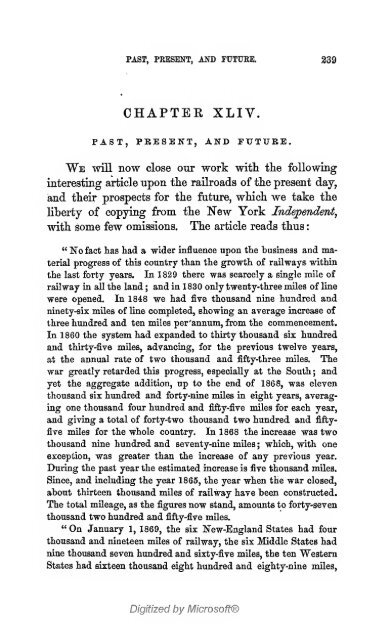The history of the first locomotives in America. From original ...
The history of the first locomotives in America. From original ...
The history of the first locomotives in America. From original ...
Create successful ePaper yourself
Turn your PDF publications into a flip-book with our unique Google optimized e-Paper software.
PAST, PRESENT, AND FUTURE. 239<br />
CHAPTEE XLIV.<br />
PAST, PEESEITT, AlTD FUTUEE.<br />
We will now close our work witli tlie follow<strong>in</strong>g<br />
<strong>in</strong>terest<strong>in</strong>g article upon tlie railroads <strong>of</strong> tlie present day,<br />
iand <strong>the</strong>ir prospects for tLe fature, wHcli we take <strong>the</strong><br />
liberty <strong>of</strong> copy<strong>in</strong>g from tlie New York Independent,<br />
with some few omissions. <strong>The</strong> article reads thus<br />
" No fact has had a wider <strong>in</strong>fluence upon <strong>the</strong> bus<strong>in</strong>ess and ma-<br />
terial progress <strong>of</strong> this country than <strong>the</strong> growth <strong>of</strong> railways with<strong>in</strong><br />
<strong>the</strong> last forty years. In 1829 <strong>the</strong>re was scarcely a s<strong>in</strong>gle mile <strong>of</strong><br />
railway <strong>in</strong> all <strong>the</strong> land ; and <strong>in</strong> 1 830 only twenty-three miles <strong>of</strong> l<strong>in</strong>e<br />
were opened. In 1848 we had five thousand n<strong>in</strong>e hundred and<br />
n<strong>in</strong>ety-six miles <strong>of</strong> l<strong>in</strong>e completed, show<strong>in</strong>g an average <strong>in</strong>crease <strong>of</strong><br />
three hundred and ten miles per'annum, from <strong>the</strong> commencement.<br />
In 1860 <strong>the</strong> system had expanded to thirty thousand six hundred<br />
and thirty-five miles, advanc<strong>in</strong>g, for <strong>the</strong> previous twelve years,<br />
at <strong>the</strong> annual rate <strong>of</strong> two thousand and fifty-three miles. <strong>The</strong><br />
war greatly retarded this progress, especially at <strong>the</strong> South ; and<br />
yet <strong>the</strong> aggregate addition, up to <strong>the</strong> end <strong>of</strong> 1868, was eleven<br />
thousand six hundred and forty-n<strong>in</strong>e miles <strong>in</strong> eight years, averag-<br />
<strong>in</strong>g one thousand four hundred and fifty-five miles for each year,<br />
and giv<strong>in</strong>g a total <strong>of</strong> forty-two thousand two hundred and fiftyfive<br />
miles for <strong>the</strong> whole country. In 1868 <strong>the</strong> <strong>in</strong>crease was two<br />
thousand n<strong>in</strong>e hundred and seventy-n<strong>in</strong>e miles ; which, with one<br />
exception, was greater than <strong>the</strong> <strong>in</strong>crease <strong>of</strong> any previous year.<br />
Dur<strong>in</strong>g <strong>the</strong> past year <strong>the</strong> estimated <strong>in</strong>crease is five thousand miles.<br />
S<strong>in</strong>ce, and <strong>in</strong>clud<strong>in</strong>g <strong>the</strong> year 1865, <strong>the</strong> year when <strong>the</strong> war closed,<br />
about thirteen thousand miles <strong>of</strong> railway have been constructed.<br />
<strong>The</strong> total mileage, as <strong>the</strong> figures now stand, amounts to forty-seven<br />
thousand two hundred and fifty-five miles.<br />
" On January 1, 1869, <strong>the</strong> six New-England States had four<br />
thousand and n<strong>in</strong>eteen miles <strong>of</strong> railway, <strong>the</strong> six Middle States had<br />
n<strong>in</strong>e thousand seven hundred and sixty-five miles, <strong>the</strong> ten Western<br />
States had sixteen thousand eight hundred and eighty-n<strong>in</strong>e miles,<br />
Digitized by Micros<strong>of</strong>t®<br />
:
















